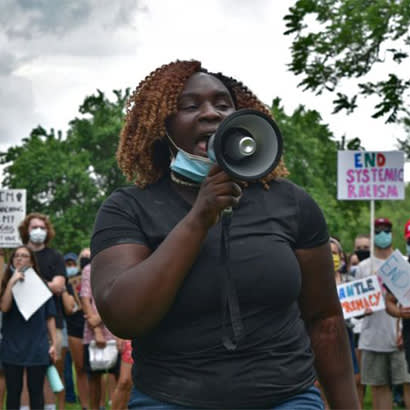
For an enhanced digital experience, read this story in the ezine.
Freedom of speech and freedom of peaceful assembly — these simple but powerful rights were the first to be added to the Constitution in 1789. These most critical rights were created so our democracy could change and grow over time. America was an early experiment in freedom and democracy, and our Founding Fathers had lofty ideas, like “all men are created equal.” But with the killing of George Floyd in May at the hands of police, the world was painfully reminded how the reality of justice in the United States contrasts greatly from what we aspire to achieve.
The protests that started in Minneapolis, Minnesota, rapidly spread across the country — first in the major cities, then everywhere. Large and small, the protests and marches compelled people to stop sheltering at home, due to the coronavirus (COVID-19) pandemic, and assemble in public to voice their desire for justice. Unlike other moments of public protest that have lasted for just days, this moment tapped deep into our sense of right and wrong. Young people, in particular, became highly motivated to take action.
One of the countless examples of this occurred on June 6 at Algonkian Regional Park in Northern Virginia, 25 miles from Washington, D.C. Ocean Akinotcho, a Potomac Falls High School student, used social media to rally 2,000 people for a Black Lives Matter march. The event began at Potomac Lakes Sportsplex, a Loudoun County Park, and proceeded through Algonkian Regional Park, which is owned by NOVA Parks. Spanning a few miles, the march featured several stops where speeches were given. While some local-elected officials spoke, many other speeches came from high school students expressing their anger over racial injustice and inequality.
During the earliest phase of the pandemic reopening, with permitted group gatherings still limited by the governor to just 10 people, it was not possible to allow a large assembly in a park. However, First Amendment rights to freedom of speech and assembly supersede the governor’s orders or park rules.
Though ordinarily, due to COVID-19, NOVA Parks would not have been able to permit the event, the agency changed course after seeing posts on social media that the march would take place as planned. Park staff reached out to the young organizer and offered help with logistical considerations — including parking, traffic control, restrooms and other issues related to public safety. During one of the first speeches, Akinotcho gave a shout out to the park staff, thanking them for being so helpful to her. Reflecting on the event, she says, “Honestly, [park staff] were a great help. They gave us a safe alternative to my original route. And during the march, they also had their employees help out with traffic and directing the crowd.”
One of the marchers, Stacey Hardy-Chandler, says, “This beautiful park setting really does reflect the message we want to send to the world — a message of justice and of peace. I was struck by the NOVA Parks sign letting everyone coming to the park know there would be a ‘First Amendment Event Today.’ This seems like a small thing, but it set the tone [by] simply letting everyone know that people — neighbors, families, students — were coming together to exercise their right to assemble peaceably. After the killing of George Floyd, the latest in a long list of those whose lives were lost so violently and senselessly, what an amazing environment to stand united so that they all truly rest in peace. So, for NOVA Parks to help make this march happen in such a safe and welcoming manner is not only a benefit to the community, but I now see the park system in a whole new way — as a backdrop for justice!”
The 2,000 marchers were comprised of mostly young people, who peacefully expressed their outrage at injustice and racism in our society and current political leadership in the United States. Due to events ranging from the Parkland, Florida, shootings to issues of racism and injustice, the generation currently in their teens and early 20s are more politically engaged than we have seen in decades. They have been at the forefront of the current energy behind the Black Lives Matter movement.
Just as freedom of speech is one of our earliest political rights, public lands are one of our earliest democratic institutions. Cities like Boston established “commons,” or areas of public land, in the middle of town long before America declared its independence. While originally used by people who did not own land to graze animals (an early social service), the commons became the place for people to gather and express their political views. Before the age of public address (PA) systems, people would often stand on a wooden soapbox to be seen and heard by the crowd. That tradition of free speech in public places continues.
While park agencies are inherently nonpartisan, the role of public lands in facilitating free speech and peaceful assembly is fundamental to our democratic system. We are in the business of offering public spaces and facilities, and at times, these public areas will serve as places for all people to exercise their constitutional rights to free speech.
Paul Gilbert is Executive Director of NOVA Parks.


